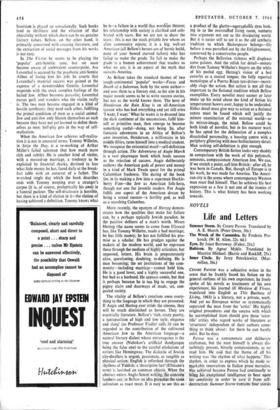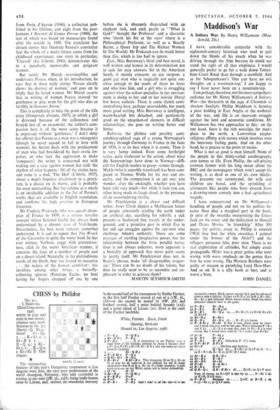NOVELS
Life and Letters
Summer Storm. By Cesare Pavese. Translated by A. E. Murch. (Peter Owen, 30s.) The Wreck of the Cassandra. By Frederic Pro- kosch. (W. H. Allen, 22s. 6d.) Eyes. By Janet Burroway. (Faber, 21s.) Rubicon. By Agnar Mykle. Translated by Maurice Michael. (Barrie and Rockliff, 25s.) Inner Circle. By Jerzy Peterkiewicz. (Mac-
millan, 36s.)
CESARE PAvEsE was a subjective writer in the sense that he frankly based his fiction on the general outlines of his own experience; he freely spoke of his novels as treatments of his own experiences; his journal (II Mestiere di Vivere, translated into English as This Business of Living, 1961) is a literary, not a private, work. And yet no European writer so systematically separated the man from the 'artist.' His highly original procedures and the success with which he accomplished them should give those 'scien- tific' critics who regard works of literature as 'structures' independent of their authors some- thing to think about: for them he can hardly exist. But he does.
Pavese was a consummate and deliberate craftsman, but the man himself is always dis- turbingly present, bitterly compassionate, as we read him. He said that the theme of all his writing was 'the rhythm of what happens.' This rhythm, in order to express which he made re- markable innovations in Italian prose narrative, was achieved because Pavese had continually to bring his exceptional intelligence to bear, upon his sensitivity in order to save it from self- destruction. Summer Storm tontains Tour stories
from Feria d'Agosto (1946), a collection pub- lished in his lifetime, and eight from the post- humous I Raconti di Cesare Pavese (1960), the text of which was based on manuscripts found after his suicide in 1950. The translator has chosen stories that illustrate Pavese's conviction that the whole of a man's future stems from his childhood experiences; one story in particular, 'Freewill' (La Liberia, 1941), demonstrates this in a peculiarly memorable and poignant manner.
But surely Mr Murch oversimplifies and underrates Pavese when, in his introduction, he says that in these early stories `Pavese clearly shows his distrust of women,' and goes on to imply that he hated women. Mr Murch asserts that in writing of women Pavese showed `no gentleness or pity, even for the girl who dies so terribly in Sumtner Storm.'
This is completely to miss the point of the title story (Temporale d'estate, 1937), in which a girl is drowned because of the callousness and brutish lust of an ex-convict; the author's com- passion here is all the more acute because it is expressed without 'gentleness.' I don't deny (or affirm) that Pavese as a man was a misogynist (though he never ceased to fall in love with women); his fiction deals with the predicament of men who feel bewildered by their erotic im- pulses, or who lack the aggression to make `conquests'; the writer is concerned not with making out a case against women but with 'the rhythm of what happens.' Of all the stories here, and none is a dud, `The Idol' (L'Idolo, 1937), about a man's hopeless attachment to a prosti- tute, is a classic on its theme, and is probably the most outstanding. But the volume as a whole is an invaluable addition to the list of Pavese's works that are available in English translation, and confirms his high position in European literature.
Mr Frederic Prokosch, who was squash cham- pion of France in 1939, is a serious novelist manqué whose fictional health has always been undermined by a chronic case of Vickibaum. Nevertheless, his best work remains somewhat underrated. It is sad to report that The Wreck of the Cassandra is quite the worst book he has ever written. Verbose, soggy with pretentious- ness, slick in the worst American manner, it concerns the fates of a number of people cast on a desert island. Naturally, in the platitudinous words of the blurb, they 'are forced to recognise . . . the nature of the human condition'; this involves, among other things, a butterfly- collecting spinster (Penelope Eccles, no less) having her fingers chopped off one by one before she is obscenely dispatched with an elephant tusk, and such pearls as "What is God?" thought the Professor' and a character who 'shook his fist at the stars' (there is a Philosophical Professor, as well as a Beastly Baron, a Queer lap and The Richest Woman In The World). Mr Prokosch can do much better than this, which is too bad to ignore.
Eyes, Miss Burroway's third and best novel, is well written and honest in its determination not to seek for easy answers. Set in the American South, it mainly concerns an eye surgeon, a good gay man who is tragically not quite sen- sitive enough to the needs of those he loves and who love him, and a girl who is struggling against what the colour-prejudice in her environ- ment is doing to her and to her naively liberal but brave outlook. There is some (faint) senti- mentalising here, perhaps unavoidable, but much more good writing. Miss Burroway is intelligent, warm-hearted but detached, and particularly good on the unspoken-of elements in difficult relationships; she goes on writing better and better.
Rubicon, the plotless and possibly semi- autobiographical saga of a young Norwegian's journey through Germany to France in the June of 1939, is at its best when it is comic. Then it is very funny indeed. Even some forthright satire, quite irrelevant to the action, about what the Sunnmorings have done to Norway—diffi- cult for English readers to grasp—comes through. Mykle (who is superbly translated) has been com- pared to Thomas Wolfe for his zest and sin- cerity, and the comparison is an apt one; you wonder, after the onslaught, whether you have been told very much—but while it lasts you are, often being made to laugh aloud, in the presence of an overwhelming vitality.
Mr Peterkiewicz is a clever and difficult writer. Inner Circle depicts a Malthusian future of people constantly circling the earth under an artificial sky, searching for rebirth; a sick present—a backward boy travels in the under- ground; and a primitive past in which Eve in her old age struggles against the ape-men who challenge Adam's authority. There are some passages of startling imaginative power, but the relationship between the three parallel narra- tives is not always coherent; more apparent is a brutality of approach that never quite seems to justify itself. Mr Peterkiewicz does not, in Keats's phrase, make 'all disagreeables evapor- ate.' There can be no doubt of his talents, but does he really need to be so recondite and un- pleasant in order to activate them?
MARTIN SEYMOUR-SMITH



































 Previous page
Previous page